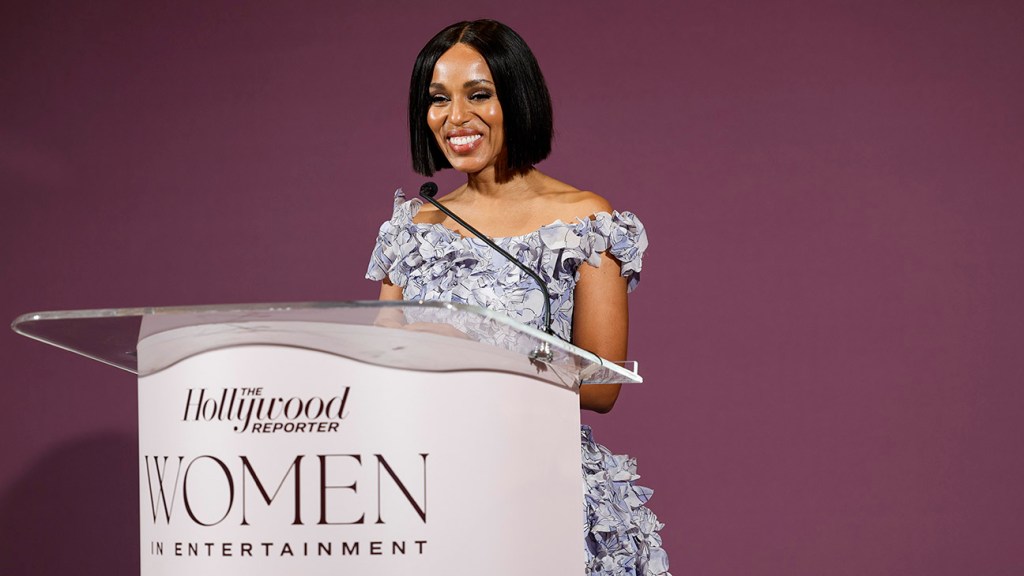Kerry Washington emphasized the importance of leveling the playing field during her acceptance speech for the Equity in Entertainment Award on Thursday at The Hollywood Reporter‘s Women in Entertainment gala breakfast, presented by Lifetime.
Ariana DeBose presented the Scandal star with the award, which recognizes individuals who amplify the voices of underrepresented communities in the entertainment industry. The Oscar winner praised the Emmy winner for always being unapologetically herself and encouraging other women to do the same.
“Every component of the career that she has built, the empire that she has created speaks to equity,” DeBose said of Washington. “How has she done that? By being herself and taking up space!”
The West Side Story star continued, “Kerry has squashed the traditional stereotype of being a Black woman in Hollywood. She has expanded our minds of what we can be — from playing the messy, complicated, dynamic Olivia Pope [in Scandal], bringing Anita Hill to the screen [in Confirmation], to producing and starring in Unprisoned.”
The actress added that Washington uses her platform to speak about things she cares about, including voting rights, reproduction rights, education, the environment, etc., and then takes the next step and educates her audience.
“But the key to all of this is Kerry herself,” DeBose shared at the event, held at The Beverly Hills Hotel. “You can see yourself in her — no matter who you are or what you look like. She goes out into the world, unapologetically herself — goofy, funny, academic, big-hearted, classy, ever graceful. She tells the truth from her perspective, and she’s blunt about it sometimes, which I personally love.”

Ariana DeBose (left) and Kerry Washington speak onstage during The Hollywood Reporter’s Women in Entertainment 2023 at The Beverly Hills Hotel on Dec. 7.
Stefanie Keenan/The Hollywood Reporter via Getty Images
Washington began her speech by expressing her love for THR‘s WIE event every year and sharing an anecdote about how her three children have been learning about equity in school. She explained that last year, her 9-year-old daughter was learning the difference between equity and equality, as well as justice.
She discussed equality and how it usually means that everybody should get the exact same things all the time, but how that isn’t enough most of the time because people need different levels of support or different kinds of assistance.
“Giving the same thing to different people who are at different starting points doesn’t allow everyone the same opportunity to succeed,” she said before adding that doesn’t mean people shouldn’t give anyway.
Washington then transitioned to discussing equity and how it’s about taking the time to pay attention and listen to who needs what support and why.
“It’s not a simple formula that can be cut and pasted from person to person — equity requires presence and awareness and patience and vulnerability and listening,” the multihyphenate continued. “Equity is not simple. And it’s not easy to get it ‘right’ all the time. It’s nuanced and complicated and sometimes it’s scary. Because equity asks us to pause and to see each other, consider each other’s unique circumstances. Because, let’s be clear. This is not a level playing field. We are NOT — in real life — on equal ground.”
She expressed that many people, due to their gender, race, socioeconomic reality, ZIP code, sexuality, religion, physical ability, personal trauma, etc., are born with a disadvantage, “carved out by systems of inequity.”
“So what does this mean for entertainment?” she asked. “We don’t cultivate equity without making space for each other’s truths. When stories from all different people and backgrounds are told, and people see their story reflected in our media and culture, that starts to weave a thread where everyone is included, and that’s a path to equity.”
Washington continued, “That is why centering stories about marginalized people is so important. This is why heroes have to look like all of us. Our stories, our movies, our television shows, our music — art teaches us to stop and slow down and really see ourselves and each other.”
She explained that every day at her production company, Simpson Street, she and her fellow execs are asking people to pause and reconsider their assumptions about history, identity, family, power, the criminal justice system, feminism, abortion rights, immigration and so on.
“But we aren’t trafficking in these themes because we want to be overtly political or singularly focused on equity,” she said. “We just believe that stories about everybody, and about the complicated truths of our time are worth telling.”
Washington shared that she feels that the battle for equity is going to require that people step into the center of their lives and stories and are willing to uplift others and be supporting characters in their stories, in order to be lead characters in their own lives.
She shared that supporting others in the fight for equity is how entertainment can get to the point of justice.
“Justice is about leveling the ground and ripping down the fence, dismantling the systems that prevent us from getting to the other side of our greatness,” she stated. “And that, we will have to do together.”
THR‘s WIE gala was sponsored by Cadillac, Google, SAG-AFTRA, Best Buy, Gersh and Upneeq and in partnership with Big Brothers Big Sisters of Greater Los Angeles, Chapman University and Loyola Marymount University. It was held in conjunction with the publication of THR’s annual Women in Entertainment issue and Power 100 list.




